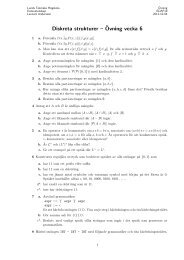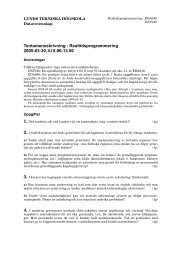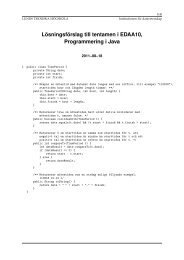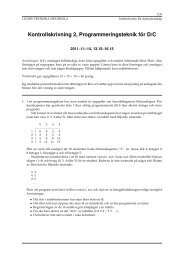JAVA-BASED REAL-TIME PROGRAMMING
JAVA-BASED REAL-TIME PROGRAMMING
JAVA-BASED REAL-TIME PROGRAMMING
You also want an ePaper? Increase the reach of your titles
YUMPU automatically turns print PDFs into web optimized ePapers that Google loves.
3.1. Threads<br />
first obtains the currently executing thread, which you can also do by calling<br />
Thread.currentThread(), and then that thread (the caller of course) will sleep.<br />
In other words, Thread.sleep(t) is the same as Thread.currentThread().sleep(t),<br />
and a thread can put itself to sleep but cannot put another thread to sleep. If<br />
that should have been possible, certain restrictions on run-time systems and<br />
code optimizations would need to be imposed, resulting in decreased (possible)<br />
performance.<br />
Note that sleep(1000) above does (in most cases) not give an update every<br />
second; the 1000 is a minimum sleeping time but there is no strict upper limit.<br />
The actual time before execution continues after sleep typically depends on<br />
the processor load. Furthermore, the sleeping for 1000 ms is from the time<br />
that called starts executing in the JVM or OS with interrupts disabled. Any<br />
time increments before then results in that much longer period of time for<br />
the update. Most often, especially in control applications, it is a periodic<br />
behaviour that is desired.<br />
We have a similar situation if we in our example wants to call displayProgress<br />
every second. Still we do not impose any upper limit on the waiting for each<br />
new second (which would be a real-time requirement), we just require no<br />
long-term drift as long as the computer is not permanently overloaded. This<br />
is accomplished in the following:<br />
1 long t, t0, diff;<br />
2 t = t0 = System.currentTimeMillis ();<br />
3 while (!transferFinished ()) {<br />
4 displayProgress(t0, t);<br />
5 t += 1000;<br />
6 diff = t - System.currentTimeMillis ();<br />
7 if (diff > 0) Thread.sleep(diff);<br />
8 }<br />
Note that t now is ideal, not reflecting temporary excessive delays. To<br />
facilitate implementation of periodic activities, there should of course have<br />
been a method sleepUntil in class Thread, but there is not. Even if it can<br />
be emulated as shown, an increment of the real time after assignment of diff<br />
but before calling sleep results in a requested sleeping time that is too long.<br />
That does not really matter since we can be delayed after the sleeping anyway.<br />
(But from a real-time systems point of view, it would be preferable to correctly<br />
inform the real-time scheduling.)<br />
3.1.4 Race conditions<br />
Knowing how to create multiple threads, let us make a multi-threaded version<br />
of the standard HelloWorld program. Consider the following example (where<br />
exceptions have been omitted for clarity):<br />
class HelloWorld extends Thread {<br />
public static void main(String[] arg) {<br />
System.out.print("Hello ");<br />
new HelloWorldApp ().start();<br />
sleep(1);<br />
47

















